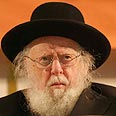
Former Chief Rabbi Avraham Shapira dies at 96
Renowned religious Zionism leader and former head of Merkaz HaRav yeshiva dies at 96. Right-wing MKs lament death of spiritual leader who opposed disengagement, left slams Shapira for telling soldiers to disobey orders
Rabbi Avraham Shapira, the former chief rabbi of Israel, died Thursday at the age of 96.
Rabbi Shapira was considered one of religious Zionism most revered spiritual leaders and was named chief rabbi of Israel in 1983 – a position he held until 1993.
Numerous public figures from both sides of the political spectrum were quick to offer their condolences as news of Shapira's death spread.
MK Zevulun Orlev (National Union - National Religious Party) called Shapira the spiritual father of religious Zionism and said the rabbi "had always been a strong supporter of the National Religious Party, which followed his teachings and path; putting an emphasis on the importance of the bible's teachings, education and the Jewish character of the state of Israel."
"He was the rabbi of all rabbis. Today we know how right he was regarding the ridiculous uprooting of Gush Katif," said Fellow party member MK Benny Elon.
MK Uri Ariel (National Religious Party) addressed Shapira's edict instructing religious soldiers to disobey orders to evacuate Jewish settlers from Gaza during the disengagement: "The Halachic decree regarding refusal was binding to all and all should have followed it."
Beilin: 'He created a crisis of faith amongst youths'
Meretz chairman Yossi Beilin also commented on the late rabbi's opinions. "On a public level, Rabbi Shapira's contribution was exceedingly negative. He was an extremist, particularly during his later years, including the issue of refusal. I don't believe that other rabbis of his stature, including Rabbi Kook, his predecessor, would have been willing to say the things he said.
"On the subject of refusing orders he crossed every last red line. Before the disengagement he was among those who gave the settlers the feeling that it would not go through, that it wouldn't happen if there was a struggle, that there would be some divine intervention. He didn't say it in these exact words, but this is the message he intended to get across.
"What he did created a very serious crisis for an entire generation. He sought to nurture faith but was in fact responsible for the biggest spiritual crisis in recent years. An entire generation of young people was willing to believe, because of him, that the disengagement wouldn't happen – and when it did, he had no answers to offer them," said Beilin.
No eulogies for Shapira
He was hospitalized in the Shaare Zedek Medical Center in Jerusalem earlier this week, after he was taken gravely ill.
His funeral is scheduled for Friday, but according to the halachic custom no eulogies will be read, nor will his family and disciples sit Shivah (seven days of mourning) on him, pending the eighth day of Sukkot.
The former head of the Merkaz HaRav yeshiva in Jerusalem – considered one of the largest in Israel – has been ill for a long time. His last public appearance was two weeks ago, when he asked to attend the Rosh
Hashanah service in Merkaz HaRav.
Rabbi Shapira held right-wing political views and was firmly against the Oslo Accords. He called against surrendering any of Israel's land in exchange for peace, citing that "giving up Israeli sovereignty in the territories is against the Halacha."










